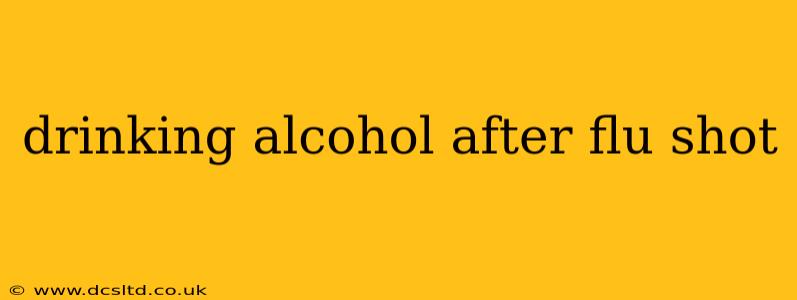Getting your annual flu shot is a crucial step in protecting yourself and your community from the influenza virus. But what about that celebratory glass of wine or post-vaccination beer? Many people wonder if drinking alcohol after a flu shot is safe. The short answer is: it's generally fine in moderation, but there are some things to consider. This article will delve into the potential effects of alcohol consumption after receiving your flu vaccine and help you make an informed decision.
Does Alcohol Affect the Flu Shot's Effectiveness?
This is a common concern, and the good news is that there's no evidence suggesting that moderate alcohol consumption significantly impacts the effectiveness of the flu vaccine. The vaccine works by stimulating your immune system to produce antibodies against the influenza virus. While alcohol can temporarily suppress your immune system, this effect is usually short-lived and doesn't seem to interfere with the long-term antibody response generated by the vaccine.
How Much Alcohol is Too Much After a Flu Shot?
The key here is moderation. Binge drinking or excessive alcohol consumption can weaken your immune system, making you more susceptible to illness, regardless of whether you've had a flu shot or not. Heavy drinking can also exacerbate potential side effects of the vaccine, such as soreness at the injection site, fever, or fatigue. Sticking to the recommended guidelines for moderate alcohol consumption—one drink or less per day for women and up to two drinks per day for men—is the safest approach.
Can Alcohol Worsen Flu Shot Side Effects?
While moderate alcohol consumption is unlikely to significantly impact the vaccine's effectiveness, it could potentially worsen some minor side effects. For example, if you experience fever or fatigue after the shot, alcohol could intensify these feelings. Alcohol is also a diuretic, meaning it can dehydrate you, and dehydration can worsen any flu-like symptoms. Therefore, it's advisable to stay well-hydrated by drinking plenty of water, especially if you've had a drink or two.
Should You Avoid Alcohol Entirely After a Flu Shot?
No, you don't necessarily need to avoid alcohol entirely after getting a flu shot. However, if you're already prone to experiencing significant side effects from vaccines, or if you have a history of alcohol-related health problems, it's best to err on the side of caution and limit or avoid alcohol consumption in the days following your vaccination. It's always advisable to consult your physician with any specific concerns, particularly if you have underlying health conditions.
What If I Feel Sick After the Flu Shot and Had Alcohol?
If you feel unwell after receiving the flu shot and have consumed alcohol, pay close attention to your symptoms. Rest, stay hydrated, and monitor your temperature. If your symptoms worsen or you experience severe side effects, such as a high fever, difficulty breathing, or persistent muscle aches, seek medical attention immediately. It's important to note that these symptoms could be due to the flu shot, the alcohol, or an unrelated illness.
Is it safe to drink the night before a flu shot?
There's no evidence suggesting that drinking alcohol the night before a flu shot will affect its effectiveness. However, it's best to be well-rested and hydrated before your vaccination to help ensure your body is in the best possible condition to respond to the vaccine. Excessive alcohol consumption the night before might lead to dehydration or fatigue, which could make you feel worse after the shot.
Can I drink alcohol after getting the flu vaccine if I'm pregnant or breastfeeding?
If you are pregnant or breastfeeding, it’s even more crucial to consult your doctor about alcohol consumption following your flu shot. The recommendations regarding alcohol intake during pregnancy and breastfeeding are generally to avoid it altogether, or to severely limit it. This is separate from the flu shot itself. The doctor can give you personalized advice based on your health status.
Disclaimer: This information is for educational purposes only and should not be considered medical advice. Always consult with your healthcare provider for any health concerns or before making any decisions related to your health or treatment.
